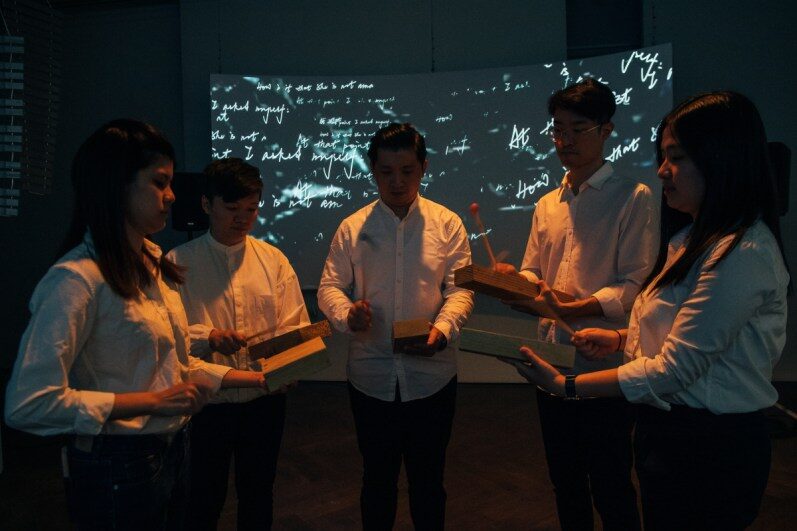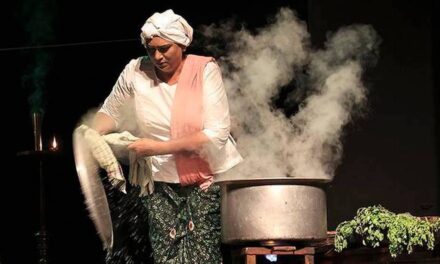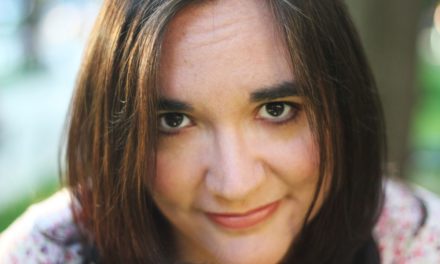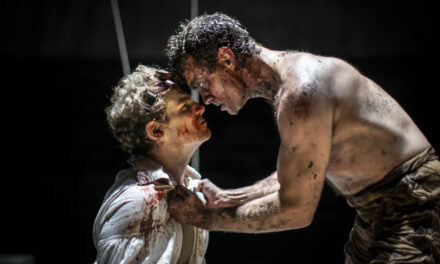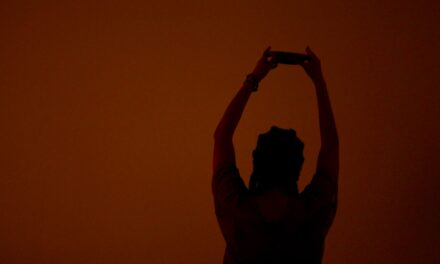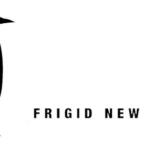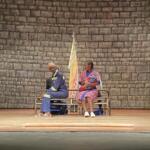Louis Siu is performing the oldest known musical practice in the world, in a coffee shop in North Point. “This is percussion,” he says, tapping the table. “This is percussion,” he demonstrates with several fast claps. “You don’t have to play an instrument. It’s just right there.” Engrossed in their phones, neighboring patrons take no notice.
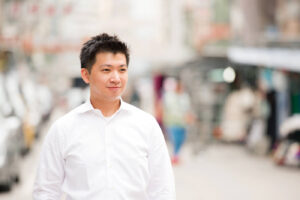
Louis Siu
Their inattention is exactly what the 36-year-old musician and cultural entrepreneur wants to change. His latest project, Toolbox Manoeuvre, which will be performed at The Pulse in December as part of the Jockey Club New Arts Power series, is the newest iteration of a four-year multimedia exploration of “acoustic otherworldliness,” using percussion in dialogue with dance, literature, sound compositions, and video. It’s also central to a larger mission to raise awareness through the arts of other uncanny shifts in Hong Kong and the importance of listening to those changes.
Siu is the founder, along with composer Austin Yip, of Toolbox Percussion, a platform for artistic experimentation, collaboration, and performance, which they launched in 2012. In addition to commissioning and touring work—earlier versions of Toolbox Manoeuvre were performed in Gwangju, San Francisco, and Shanghai—the company hosts an annual innovation lab, the Toolbox International Creative Academy, and leads outreach programs for children and students. In 2021, Toolbox Percussion is a Leisure and Cultural Services Department Community Cultural Ambassador and, for Jockey Club New Arts Power, is curating family workshops that encourage children to tune their ears to sounds in nature, like wind and birdsong, and then forage materials for creating homemade percussion instruments.
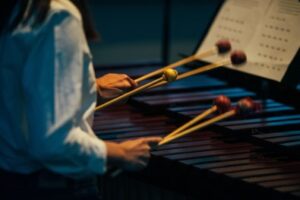
“Toolbox Manouevre.” PC: Toolbox Percussion.
As his impromptu table drumming sets a spoon clinking in a bowl while an espresso machine lets out a prolonged burst of steam, Siu inadvertently calls attention to the sonic environment of a busy cafe at lunchtime. “We want to teach people about creativity and how to listen,” he says of the company’s mission, aimed at both adults and children. “My feeling is we are percussion instruments, we have percussions in our body, our pulse, our breathing, that keep us alive.” Appropriately, Toolbox Percussion’s tagline is #feelthepulseNOW.
Toolbox Manoeuvre’s pulse beats on many frequencies. Musically, the show is conceived around compositions by Yip, fellow Hong Kong composer Joyce Tang and the American minimalist composer Steve Reich, performed by eight musicians on marimbas, vibraphones, bongos, tom-toms and woodblocks. During a rehearsal at a primary school in Kowloon Tong earlier that week, the languorously resonating marimbas and vibraphones, accented by the muted claps of the drums and woodblocks, created an almost hypnotic sonic tapestry that was a little like listening to a powerful river jumping over a rocky bed. Another comparison might be made with the ocean rolling in waves onto the beach in Repulse Bay, which will be visible during performances in The Pulse’s third floor space. Part of Siu’s motivation for performing at The Pulse was to join orchestral and natural sound waves with the human body as a resonance chamber for both.
The show also pulsates with the arrested energy of four short texts by Franz Kafka: “The Trees,” “On the Tram” (which inspired Yip’s composition), “Resolutions,” and “The Street Window,” all of which are run through by the author’s characteristic coupling of anomie and keen observations of human society. Projected in English and read as individual lines, randomly reassembled, in Cantonese, Kafka’s descriptions of isolation and longing in an anonymous city fall in step with the vibrations of Hong Kong today, a concordance that is given form by Alice Ma’s choreography, which she performs with dancer Wayson Poon.
Yip, whose work has been internationally recognized and who, with Siu, co-conceived the first version of Toolbox Manoeuvre in 2017, explained by email that it was through the literature of Japanese author Murakami and Kafka that he came to understand “the relationship between music and other art forms” and how to “unfold ideas” and “create tension” when composing. His piece, “Urban Construction,” musically evokes Kafka’s tram rider, a loner who “stays in darkness,” as Yip imagines him, and through a minimalist composition, conveys Kafka’s sense of hopelessness.
Yip has composed his own take on the Hong Kong commuter’s experience as a mythological descent into the underworld, yet Kafka’s words from a century ago still strike a familiar chord today: “I stand on the end platform of the tram and am completely unsure of my footing in this world, in this town, in my family.”
A bicultural Hongkonger, Siu feels those tensions intimately, describing himself as “a colonial-grown kid,” marked more deeply by the “clash” of British and Chinese cultures in Hong Kong than by either of them individually. Attending conservatories in Australia and the United States further broadened his horizons. “Sometimes I don’t know who I am,” he says with a bemused smile. He channels those ambiguities into Toolbox Manoeuvre to explore what has changed in Hong Kong since his youth.
“We are losing something. You can put it in so many ways, in a way that gets you in trouble, or you can put it in personal ways. Just like the moon is leaving the Earth,” he reflects, using the popular metaphor to express helplessness and grief at the loss of what was once utterly reliable and familiar.
In a world in flux, Siu sees a way forward by driving disruption, rather than reacting to changes he believes are inevitable. In rehearsal, he gave directions to his musicians to leave their instruments and join the choreography, despite their hesitation. He describes this as “expanding the sensations or the horizon” of his collaborators. As a former principal percussionist with the Macao Orchestra, Siu has some authority in the matter when he says, “Classical musicians are kind of boring for me.” In contrast, he wants to create “a smaller experimental percussive theatre.”
Siu’s disruptions can also take place at the intersections of fine arts and community arts and between different arts practices. In July, Toolbox created a multimedia installation, “Double Listen,” at H Queen’s in Central. An opportunity for Toolbox to work in a dedicated gallery space, it drew from composition commissions in the company’s archive, multi-channel audio and video, and newly commissioned sound sequences.
Toolbox is also preparing a book-cum-travel guide of interviews and soundwalks with artists. One of those featured is the product designer Kay Chan Wan-ki, co-founder of the Good Day Society and the KaCaMa Design Lab, which specializes in sustainable design created from recycled post-consumer waste. The interview will take place on the newly completed Tuen Ma MTR line, while Siu records the sounds that can be heard along the journey. Further out on Toolbox’s horizon is a Hong Kong-San Francisco music biennale, a project whose foundations Siu began to lay through an MA in Arts and Cultural Enterprise at Central Saint Martins he completed in 2020, and which will build on a partnership he has cultivated over many years with the Chinese Culture Center of San Francisco.
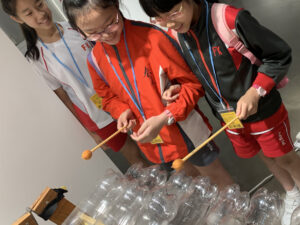
Workshop by Toolbox Percussion.
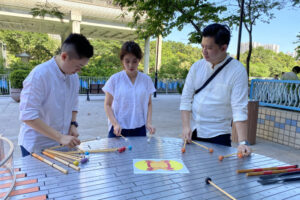
Workshop by Toolbox Percussion.
Siu stressed frequently in our discussions that Toolbox is “not just a percussion group” but a platform for new artistic creation and collaboration in forms designed to meet audiences where they are – which may not be inside an auditorium or concert hall. “People haven’t grown up with much arts culture, only their phones, so it’s just a matter of time before they choose something else. Artists have to change to answer those needs,” he says, acknowledging that making that shift is particularly challenging in Hong Kong, where the nine major arts groups receive the lion’s share of attention. This is especially true in the music scene, where classical genres dominate. Toolbox, on the other hand, is trying to reach beyond the traditional classroom and concert hall settings. “I’m just thinking and seeing something bigger,” he says.
That big vision grows from collaborations with leading figures working on the frontiers of music, sound, and performance. These include the Japanese-American sound artist and composer Ken Ueno, who is Toolbox Percussion’s Creative Director-in-Residence and who holds the Jerry and Evelyn Hemmings Chambers Distinguished Professor Chair in Music at the University of California, Berkeley. Likewise, Hong Kong native Samson Young, whose sound performances and installations have been commissioned by Art Basel and shown at museums and festivals around the world, has contributed compositions and serves on the company’s Board of Directors.
Audiences arriving at The Pulse will almost immediately discover another of Toolbox’s noteworthy collaborators, the Hong Kong poet Nicholas Wong, winner of the Lambda Literary Award in Gay Poetry and Australia’s Peter Porter Poetry Prize. Two of Wong’s poems, “Five Acts with Father” and “Biased Biography of My Mother,” which take a stinging swipe at filial piety, will be featured in a pre-show installation that Siu has imagined as a portal into the imagined sonic space of the performance and a necessary zone for acclimating audiences to it. The installation will include video and John Cage’s “Radio Music,” a piece composed for radio frequencies. Post-show, the public will have the opportunity to write and send postcards to share what they heard, saw and, above all, felt.
Siu hopes that they will take a moment to consider where we are, and potentially where we can go from here, in society as in the arts, just as both teeter on the precipice of major transformations due to technology and AI. Believing firmly that audiences are hungry for programmes that engage and invite reflection and explore new art forms, he is optimistic that his work will reach an ever expanding audience and open doors for other artists as well. “I’m just trying to use what we are good at to create something in a way that keeps us alive, human, to continue to feel our own pulse,” he says. “I think that is the only way to survive.”
Toolbox Manoeuvre takes place from December 3 to 5, 2021, at The Pulse in Repulse Bay. Click here for showtimes, tickets and more information.
This article was originally published by Zolima Citymag on November 23, 2021, and has been reposted with permission. To read the original article, click here.
This post was written by the author in their personal capacity.The opinions expressed in this article are the author’s own and do not reflect the view of The Theatre Times, their staff or collaborators.
This post was written by Molly Grogan.
The views expressed here belong to the author and do not necessarily reflect our views and opinions.

